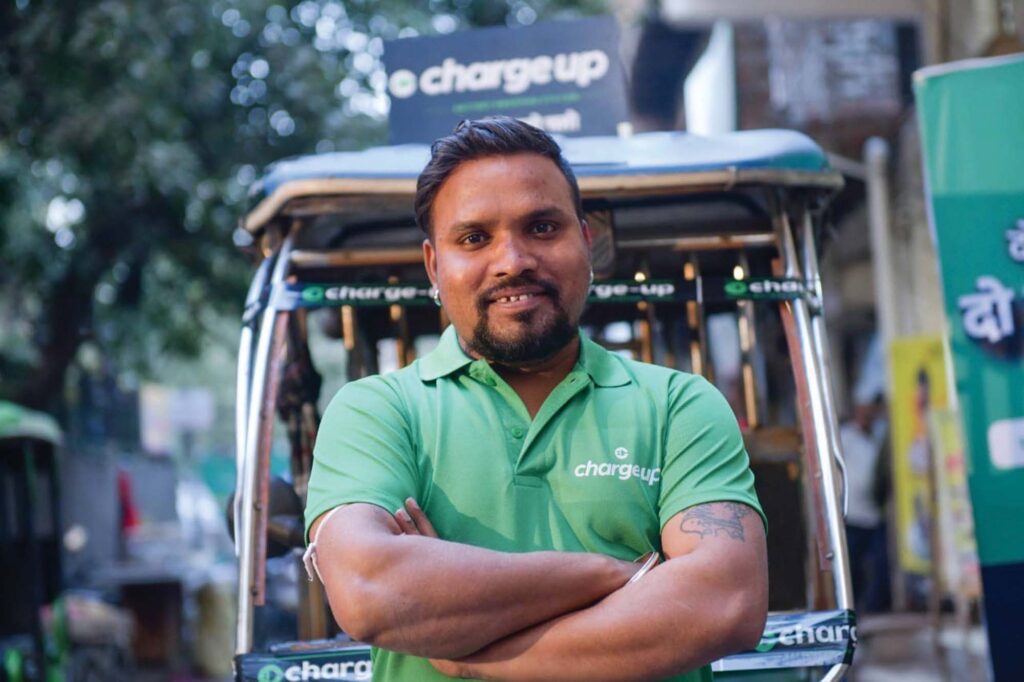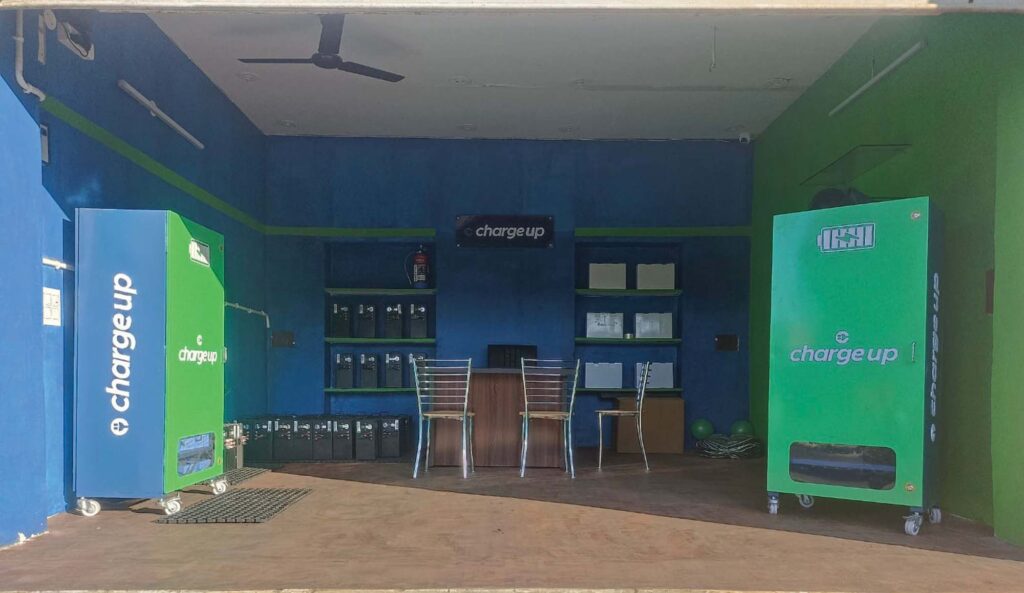
In a free-wheeling discussion with Rajesh Rajgor, Varun Goenka, Co-Founder & CEO of ChargeUp, highlights the company’s mission to combat environmental issues through sustainable innovations. Established in 2019, ChargeUp is dedicated to creating the largest electric two and three-wheeler distribution network, particularly focusing on e-rickshaws as an affordable and eco-friendly mode of transportation. E-rickshaws had previously struggled with long charging times and limited battery life, leading to low driver earnings. ChargeUp’s innovative solution, Battery as a Service (BAAS), allows e-rickshaw drivers to subscribe to a daily battery rental plan, enabling easy battery swaps at ChargeUp stations. This initiative has significantly increased driver earnings, extended travel ranges, and reduced ownership costs. ChargeUp has seen impressive growth, with plans to expand and serve more electric vehicles, contributing to sustainable mobility and emissions reduction.
How does ChargeUp address environmental sustainability and support Aatmanirbhar Bharat through clean-tech solutions?
ChargeUp’s strategy for environmental sustainability and contributing to Aatmanirbhar Bharat rests on three key pillars. Firstly, we aim to boost the earnings of electric vehicle (EV) entrepreneurs, thereby encouraging more individuals to adopt EVs for their livelihoods and nurturing a sustainable transportation ecosystem. Secondly, our commitment is to reduce the total cost of ownership (TCO) for EVs, making them more accessible and environmentally friendly. Lastly, we offer financial security to EV entrepreneurs by providing initiatives such as income stability, financial services, and insurance options to bolster their career choices.
To actualize this vision, we have introduced ‘Energy as a Service.’ Through this innovative approach, we have increased the earnings of EV entrepreneurs by an impressive 100%. This benefits individuals and fosters a robust community of drivers, which has been pivotal in the expansion of our operations. Starting with 100 drivers, our network rapidly grew to encompass 3,500 drivers, exemplifying the power of the network effect.
Collectively, our approach has elevated earnings by $8 million and covered 71 million green kilometers, resulting in the avoidance of 6.2 million tonnes of CO2 emissions. This clearly demonstrates our dual impact on financial well-being and environmental sustainability.

How is ChargeUp contributing to sustainable transportation and carbon emission reduction in India’s growing EV market?
ChargeUp is actively contributing to sustainable transportation and the reduction of carbon emissions in India’s burgeoning EV market through its innovative Fi-Ne-Tech ecosystem, centered around Finance, Network, and Technology availability. In the Finance aspect, ChargeUp alleviates financial barriers, rendering EVs more affordable and, in turn, encouraging the transition from traditional fossil fuel vehicles to electric ones. The company’s expansive Energy as a Service (EaaS) network cuts EV operating costs by up to 50%, promoting the widespread adoption of electric vehicles. Furthermore, ChargeUp’s commitment to Tech involves secure and predictive maintenance to extend the lifespan of EV assets and reduce defaults, contributing to an overall reduction in emissions within the transportation sector.
In what ways is ChargeUp revolutionizing electric vehicle charging, making it more efficient and accessible for drivers?
At ChargeUp, we are revolutionizing EV charging by harnessing the data-rich nature of EVs, which can be thought of as ‘gadgets on wheels.’ By leveraging the wealth of information these vehicles provide about their performance and batteries, ChargeUp optimizes its energy network. This data-driven approach enables the company to maintain 100% uptime for drivers by proactively identifying and addressing issues through its predictive algorithm. By maximizing efficiency and ensuring reliable charging infrastructure, ChargeUp enhances accessibility and convenience for EV drivers, facilitating a smoother and more accessible transition to electric mobility.

How does the launch of India’s first solarized battery swapping station in Jaipur set a precedent for sustainable infrastructure in the EV industry and its environmental impact?
The solarized battery swapping station, located at Beniwal Kanta, Chungi Circle, Ramgarh Mod, Jaipur, is owned and operated by ChargeUp. With its advanced solar technology, the station harnesses the sun’s power and integrates it with the charging grid to facilitate solar-generated energy transfer to the charging cabinet. This eco-friendly approach reduces dependence on traditional energy sources, contributing to a cleaner environment. Moreover, the station has an impressive capacity, capable of charging 140 kWh of batteries, which covers 20% of its total energy needs. The launch of India’s first solarized battery swapping station in Jaipur signifies a groundbreaking step toward sustainable EV infrastructure and its broader environmental effects. By combining the sustainability of EVs and environmentally friendly solar power, it reduces dependence on fossil fuels, a major source of pollution. This station not only decreases carbon emissions but also ensures power reliability in areas with inconsistent grids. Its scalability sets the stage for similar projects across the country, thereby advancing the cause of sustainable energy utilization in transportation. This Jaipur station leads the way for eco-friendly EV infrastructure and a greener future for mobility and environmental preservation.
How do ChargeUp’s driver-centric initiatives empower local communities and individual drivers?
ChargeUp’s initiatives have a substantial impact, empowering both drivers and communities:
Increased Daily Earnings: Drivers’ daily earnings have nearly doubled, rising from INR 22,000 to INR 45,000, improving livelihoods and boosting local economies.
Elimination of Recurring Battery Investment: By eliminating the need for recurrent battery investments, our approach eases the financial burden on drivers, ensuring a stable income source.
Freedom to Take Longer Routes: Drivers can now take longer routes without battery concerns, enhancing their earning potential and job satisfaction, which benefits local economies.
Access to Credit and Low Total Cost of Ownership: ChargeUp’s model offers easy access to credit and ensures a low total cost of ownership for EVs, encouraging more drivers to adopt eco-friendly transportation.
Continual Innovation for Driver Needs: ChargeUp’s dedication to battery technology and product development meets drivers’ specific needs, facilitating their smooth and successful transition to EVs.
Community Building and Referrals: Early adopters who began in 2019 have formed a supportive community, demonstrating loyalty and trust in ChargeUp, and actively referring new drivers, strengthening the sense of camaraderie within the driver community.
How does solar energy contribute to the growth of the EV market in India?
Solar energy plays a pivotal role in driving the growth of India’s EV market. By integrating solar power into EV charging, we create a sustainable and cost-effective energy cycle. This reduces EV charging costs, ensures 100% clean energy, and addresses power outages, particularly in tier 2 and 3 cities. Solar-powered networks also promote the expansion of the solar sector, save energy costs, and enhance grid independence, making EV adoption easier, even in areas with unreliable power infrastructure.
How does ChargeUp promote eco-conscious transportation in urban areas?
ChargeUp employs a multi-pronged approach. We use solar power for charging, reducing the carbon footprint and setting a green example for urban mobility. We expand our infrastructure to make EV entrepreneurship accessible and convenient, alleviating range anxiety. Additionally, our strategically located charging stations support last-mile connectivity, making eco-conscious transportation more accessible in urban areas.
Could you discuss the economics of clean tech in the context of ChargeUp’s initiatives and how it aligns with the company’s goals?
ChargeUp’s clean tech approach, particularly utilizing solar power at approximately INR 3 per unit, reduces energy costs by up to 70%. This not only benefits drivers but also reinforces sustainability and environmental commitment. Clean tech reduces operational expenses, complements the goal of reducing carbon emissions, and demonstrates an economically viable and eco-friendly approach.
What are ChargeUp’s expansion plans in emerging markets, and how does clean tech evolve in these regions?
ChargeUp focuses on emerging markets, particularly Tier-2 and Tier-3 cities in India. By targeting 3-wheelers, we provide reliable power, reduce coal dependence, and align with local needs for eco-conscious transportation. Clean tech solutions in these regions reduce air pollution, enhance energy efficiency, and drive economic development, showcasing the transformative potential of clean tech in emerging markets.
How does ChargeUp collaborate with stakeholders to drive change in the EV infrastructure landscape?
ChargeUp actively collaborates with public and private stakeholders, including government entities, to create an enabling environment for EVs. These partnerships ensure policy support, regulatory frameworks, and incentives for eco-friendly transportation solutions. This collaboration expands ChargeUp’s reach and contributes to the broader goal of sustainable mobility and clean energy adoption, fostering change in the EV infrastructure landscape.